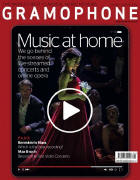Texte paru dans: / Appeared in: Sony 19075929912 |
|
|
Outil de traduction (Trčs approximatif) |
|
|
Reviewer:
Mark Pullinger There’s Venetian intrigue here, a touch of smoke and mirrors. The booklet cover itself raises two questions. ‘Martin Fröst Vivaldi’ is the disc’s title yet, although the Red Priest did write for both clarinet and salmoč (chalumeau, a reed instrument that developed from the recorder) in a handful of concerti grossi, he never composed any solo concertos for the clarinet, an instrument which was still in its infancy at the start of the 18th century. What Fröst plays here are three ‘hypothetical concertos’ reimagined by Andreas Tarkmann who, focusing on the instrument’s vocal qualities, draws on operatic arias. Each is given a title – let’s face it, Vivaldi’s best-known concertos are the ones with nicknames – so we have the B flat Sant’Angelo, the D minor La fenice and the F major Il mezzetino. So far, so good. Fröst has the excellent period-instrument Concerto Köln as his partners in crime and he plays on a specially made boxwood clarinet (see page 11 for more details). This is no recreation of the two- or three-key early clarinet, which had a weak and windy lower register, but has all the usual keywork of the modern instrument. Its sound is warm and buttery, particularly in its low ‘chalumeau’ register, and its agility, spinning around Vivaldi’s dazzling vocal lines, is incredible. Warning: do not attempt this on your period clarinet! Fröst is an outstanding musician and every operatic roulade and embellishment is expertly turned with the precision of a master craftsman. The finale of the Sant’Angelo (taken from Ottone in villa) bubbles with high spirits and you sense the relish of Fröst’s scorching attacks in the fast runs of ‘Alma oppressa’ (from La fida ninfa) in the first movement of La fenice. Do they convince as concertos? Not especially, but I don’t think that’s the point. If Tarkmann had wanted to strike more of an authentic note, there are around 350 solo concertos that could have been purloined and transcribed. What make these enjoyable works in their own right are the florid writing and operatic drama of the outer movements and the incredible tenderness that Vivaldi lavished on some of his slow arias, such as ‘Mentre dormi’ from L’Olimpiade and the beguiling pizzicato accompaniment he used in ‘Sento in seno’ in Il Giustino. Vivaldi’s operas have often been compared unfavourably to Handel’s, yet Tarkmann’s selection demonstrates his remarkable range of invention. There is echt Vivaldi here, a couple of operatic sinfonias played with energy and fire by Concerto Köln. The disc ends with ‘Veni, me sequera fida’, an aria about the lament of a turtle dove from the oratorio Juditha triumphans, in which Vivaldi deployed the soprano chalumeau in an obbligato role. Here the vocal line is taken by the cellist Alexander Scherf, effectively turning it into a beautiful duet. And the other question about the cover? Why on earth is Fröst pictured wielding his standard Buffet Crampon instrument when he plays a boxwood clarinet on this disc? That’s a mystery that remains unsolved but seems a bit of an own goal on Sony’s part. |
|




